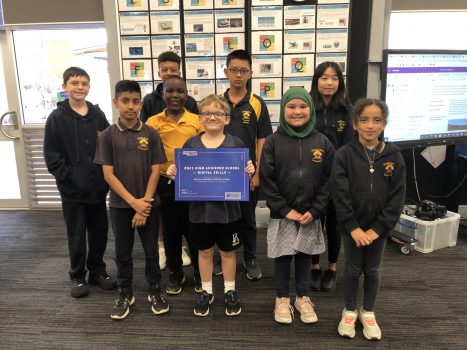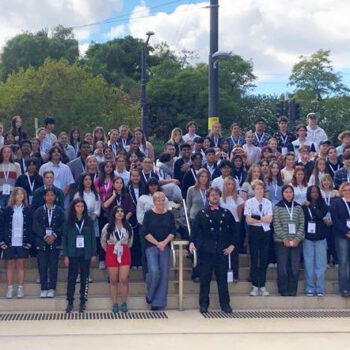The prize, Coding in Minecraft, is a computer science credentialed program delivered though Minecraft: Education Edition. Coding in Minecraft encourages young and diverse learners through game-based learning with a coding and computer science curriculum. Donated by Prodigy Learning, CEO Andrew Flood had this to say about this year’s winners:
“We are excited for Challa Gardens Primary School students to start their Coding in Minecraft journey which will immerse them in a Minecraft world to develop and prove their coding skills.”
Challa Gardens Primary School had a combined total of 235 students who participated in all three of the Commissioner’s Learn to Speak Robot, Space to Dream and Zoom Out! digital challenges throughout the year. A ‘Grow & Glow Reflection – Bee-Bot’ was submitted by Challa Gardens Primary School for the Learn to Speak Robot Challenge along with a systems thinking testimonial about what they learned by participating in Zoom Out! A number of students also submitted designs for the Space to Dream Challenge. Commissioner Helen Connolly was delighted by the originality and creativity of the students’ ideas and designs.
When asked what they enjoyed most about the Commissioner’s Digital Challenge, students said they loved how it encouraged them to explore technology in creative and scientific ways.
“We can build on our creativity with all the fun things we have because of the laptops and the iPads, we’ve had so much fun using them, and we’ve learned how to code with them and how to get better at using them, which will help us later in life” (Noah, Year 5)
Because digital skills are life skills it is now more important than ever that students are learning these skills for the future. When asked what the most important thing they learnt throughout the Challenge was, students stressed the importance it places on the impact technology will have on their lives in the future, and how important it is to gain skills that will be relevant.
“I think it’s the coding, as you might need that in your future jobs. Or it might just help you daily and if someone doesn’t know how to code or use technology you can teach them.” (Needa, Year 5)
“What we are learning is the basics. In the future it will grow more and be more advanced, so if we learn the basics now, it can help us with our businesses and our future.” (Mujtaba, Year 4)
By starting the learning process around how to best harness digital technologies early in their lives, we ensure children and young people are better prepared for their future, and given the best chance to succeed in areas that interest them.
“We need to know how to use digital technology at school, because as we grow older more jobs are produced and every single job uses technology now. If you don’t know how to use technology, it will be very hard for you in life.” (Juju, Year 4)
Children know intuitively that technology will have an even bigger part to play in their future than it does now. They are aware that human application of digital technology will provide solutions to some of the world’s most pressing problems. When asked how digital skills could solve these problems, Challa Gardens Primary School students said:
“They’re very important, because let’s say they discover something new, but it could be dangerous there – they can use technology to send a drone into the area instead.” (Charlie, Year 7)
Students were adamant that digital skills and technology could solve climate change.
“An example could be pollution in the ocean, we can make machines that take the pollution and bring it back to land and recycle them and use it again, the world would be cleaner and there’s ways we can help the world.” (Mujtaba, Year 4)
“The pollution levels in the air makes it worse for the environment, and if we use digital stuff it will help us lower the pollution levels.” (Neo, Year 3)
When asked about their future careers, many students think technology will play a critical role in their day-to-day lives. Some said they wanted to be video game tester or creator, others said they wanted to be a doctor, a nurse, or even a mechanical engineer with the commonality in all their answers being that digital skills will be needed in future careers in some capacity.
At the forefront is their digital technologies teacher, Elizabeth Adams. Understanding the importance of computational and systems thinking to the future of children, Mrs Adams had this to say:
“Teaching students coding is teaching them computational thinking. Students problem-solve every step of the way. They learn that there is a sequence of steps to follow and can repeat these to get the solution they’re after.” (Elizabeth, Teacher)
Challa Gardens Primary School also participated in last year’s digital challenges and won a VEX Robotics Kit. Developing children and young peoples’ digital skills is important, but so is engaging them in the learning process in different ways.
“At Challa Gardens Primary School, students learn to code in different environments, they’re designing, being creative and with that are developing a deeper understanding of how technology works. And they’re being prepared for future careers!” (Elizabeth, Teacher)
The Commissioner’s Digital Challenge is run annually from January to September.
Wonderful prizes provided by Challenge Partners Prodigy Learning, VEX Robotics and GROK Academy are awarded to participating schools each year.
FREE Early bird registration for 2022 is available for schools at: https://commissionersdigitalchallenge.net.au/registration/

Left to right: Charlie (Yr 7) Mujtaba (Yr 4) Fazal (Yr 7) Noah (Yr 5) Neo (Yr 3) Viet (Yr 6) Needa (Yr 5) Krystal (Year 6) and Juju (Yr 4)
Students from Challa Gardens Primary School holding their High Achiever School Certificate for exemplary participation in the 2021 Commissioner’s Digital Challenge. A total of 235 students participated in Learn to Speak Robot, Space to Dream and Zoom Out! Challenges winning access to Coding in Minecraft for the whole school, kindly donated by Challenge Partners Prodigy Learning.




